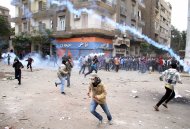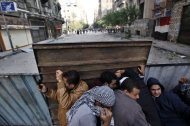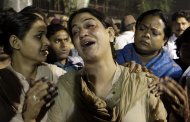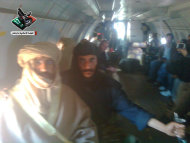

Egyptian soldiers and police set fire to protest tents in Cairo's Tahrir Square and fired tear gas and rubber bullets in a major assault Sunday to drive out thousands demanding that the military rulers quickly transfer power to a civilian government. At least 11 protesters were killed and hundreds were injured.
It was the second day of clashes marking a sharp escalation of tensions on Egypt's streets a week before the first elections since the ouster of longtime authoritarian leader Hosni Mubarak in February. The military took over the country, promising a sw
ift transition to civilian rule. But the pro-democracy protesters who led the uprising have grown increasingly angry with the ruling generals, and suspect they are trying to cling to power even after an elected parliament is seated and a new president is voted in.
Street battles continued throughout the day and long into the night, spreading to side streets and sending a wave of injuries to makeshift clinics on the streets.
The military-backed Cabinet said in a statement that elections set to begin on Nov. 28 would take place on time and thanked the police for the
ir "restraint," language that is likely to enrage the protesters even more.
"We're not going anywhere," protester Mohammed Radwan said after security forces tried unsuccessfully to push the crowds out of Tahrir, the epicenter of the uprising. "The mood is good now and people are chanting again," he added after many of the demonstrators returned.
The two days of clashes were some of the worst since the uprising ended on Feb. 11.
They were also one of only a few violent confrontations to involve the police since the uprising. The black-clad police were a hated symbol of Mubarak's regime and after the uprising, they have largely stayed in the background while the military took charge of security.
The military, which took over from Mubarak, has repeatedly pledged to hand power to an elected civilian government, but has yet to set a specific date. The protests over the past two days have demanded a specific date be set.
According to one timetable floated by the army, the handover will happen after presidential elections late next year or early in 2013. The protesters say this is too long and accuse the military of dragging its feet. They want a handover immediately after the end of the staggered parliamentary elections, which begin on Nov. 28 and end in March.
The protesters' suspicions about the military were fed by a proposal issued by the military-appointed Cabinet last week. It would shield the armed forces from any civilian oversight and give the generals veto power over legislation dealing with military affairs.
But other concerns are also feeding the tensions on the street. Many Egyptians are anxious about what the impending elections will bring. Specifically they worry that stalwarts of Mubarak's ruling party could win a significant number of seats in the next parliament because the military did not ban them from running for public office as requested by activists.
The military's failure to issue such a ban has fed widely held suspicion that the generals are reluctant to dismantle the old regime, partly out of loyalty to Mubarak, their longtime mentor.
The Supreme Council of the Armed Forces issued a statement expressing "regret for the events."
The council doesn't intend "to extend the transitional period and will not permit by any means hindering the process of democratic transition," it said a statement read out on state TV.
The violence began Saturday when security forces stormed a sit-in at Tahrir Square staged by protesters wounded in clashes during the 18-day uprising in January and February and frustrated by the slow pace of bringing those responsible to justice.
The wounded, some on crutches, ran away when police attacked, but some fell down and were beaten by police.
One of those injured on Saturday was dentist Ahmed Hararah, who lost the sight in his right eye on Jan. 28 and now thinks he lost the sight in his left eye despite treatment at an eye hospital in Cairo.
The violence resumed Sunday, when police fired tear gas and rubber bullets to try to clear about 5,000 protesters still in Tahrir. Many chanted "freedom, freedom" as they pelted police with rocks and a white cloud of tear gas hung in the air.
"We have a single demand: The marshal must step down and be replaced by a civilian council," said protester Ahmed Hani, referring to Field Marshal Hussein Tantawi, head of the ruling military council and Mubarak's longtime defense minister. "The violence yesterday showed us that Mubarak is still in power," said Hani, who was wounded in the forehead by a rubber bullet.
Many of the protesters had red eyes and coughed incessantly. Some wore surgical masks to ward off the tear gas. A few fainted, overwhelmed by the gas.
Around sundown, an Associated Press reporter in Tahrir said police and troops briefly chased the protesters out of most of the square. They set at least a dozen of the protesters' tents, along with blankets and banners, ablaze after nightfall and a pall of black smoke rose over the square as the sound of gunshots rang out.
"This is what they (the military) will do if they rule the country," one protester screamed while running away from the approaching security forces.
Protesters initially ran away in panic while being chased by army soldiers and police hitting them with clubs. But they later regrouped at the southern entrance of the square next to the famed Egyptian museum and began to walk back to the square. Hundreds made their way back, waving the red, white and black Egyptian flags and chanting "Allahu akbar," or God is great.
Both sides then began pelting each other with rocks.
Security forces pulled back to the outskirts of the square, where clashes continued into the night.
A video posted on social networking sites showed a soldier dragging the motionless body of a protester along the street and leaving him in a garbage-strewn section of Tahrir Square.
A medical official at Cairo's main morgue said at least 11 protesters were killed on Sunday. He spoke on condition of anonymity because he was not authorized to talk to reporters.
Doctors at two field hospitals in the square said that among the dead was one man killed by a blow to his head and another by gunshots.
Rocks, shattered glass and trash covered Tahrir Square and the side streets around it. The windows of the main campus of the American University in Cairo, which overlooks the square, were shattered and stores were shuttered.
"The marshal is Mubarak's dog," read freshly scrawled graffiti in the square.
An Interior Ministry statement said some of the protesters were using firearms, firebombs and knifes to attack security forces.
Clashes also took place in the city of Suez east of Cairo, the coastal city of el-Arish in the Sinai Peninsula, the city of Alexandria and Assiut in southern Egypt.




